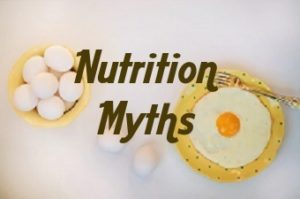 Nowadays, many people strive to know how to become healthy. They read blogs, enroll in weight loss sessions, and study everything about nutrition. They join some groups of nutrition enthusiasts and ask questions about healthy diet and proper nutrition.
Nowadays, many people strive to know how to become healthy. They read blogs, enroll in weight loss sessions, and study everything about nutrition. They join some groups of nutrition enthusiasts and ask questions about healthy diet and proper nutrition.
Looking throughout the ages, food has been used for medicine even in ancient Greece. Hippocrates, the “Father or Medicine”, stated: “Let thy food be thy medicine and medicine be thy food.” When it comes to dieting, it’s recommended you ask a holistic nutritional therapist for the answers to your questions.
However, not everything we learn about nutrition is true. In fact, you have to be aware of some myths regarding nutrition that has been told by the mainstream media for years, so it’s important to distinguish fact from fiction.
Today, we will be focusing on five misconceptions spread by mainstream nutrition.
1. Milk Is Nutritious
We are taught to believe that milk is good for our health. In most of our diet plans, milk has always been on the list. As a matter of fact, it’s part of the usual food pyramid we see in many presentations. Little did we know that most of what we learned about milk came from milk manufacturers.
One example of this misconception is the advantages of cow’s milk for infants. Nowadays, these statements are being rejected by many experts. Infant formulas are also being discouraged as they can have dangerous effects.
On the other hand, even milk for adults is not really healthy, or nutritious. When milk gets pasteurized, its components change dramatically, and such changes produce allergens that cause many health complications. In addition, milk contributes to obesity as it contains high amounts of carbohydrates.
2. Eggs Are Full of Cholesterol
This has been what many people have believed for many decades. It has been said that eggs are very unhealthy because they contain a high amount of cholesterol.
However, in 2010, Yale Prevention Research Center conducted a study that showed that eggs do not have any negative effect on the subjects who were given 2 eggs per day for 6 weeks. In fact, the result shows many signs that eggs offer more positive health benefits than negative ones.
3. Soy Is Good for a Healthy Diet
The fact that soy is a healthy food is a myth. However, many people didn’t know about this, and on the contrary, you may have noticed that soy products, whether they are organic or not, have become very popular.
They invade the nutrition market and continue to sell up to this date. Organic soy does not add any benefit to our health, but and some doctors point that soy is actually toxic for the body.
4. Fat Consumption Makes You Become Fat
This is totally a misconception. If fat makes a person fat or obese, all patients with heart diseases must also have weight problems.
However, there are many patients with heart diseases who are not fat. What makes a person obese is the consumption of the amount of carbohydrates they consume.
5. Artificial Sweeteners Are Good Alternative to Sugar for Diabetics
For a while artificial were sweeteners are believed to be a better alternative for sugar, especially for diabetics. Nevertheless, there is a growing debate that artificial sweeteners are bad for health.
Conclusion
There are many misconceptions and myths about nutrition that have already been widely spread and made people believe them to be authoritative which we see isn’t the case. Nevertheless, you can consult an experienced holistic nutritionist to keep you right on track.



